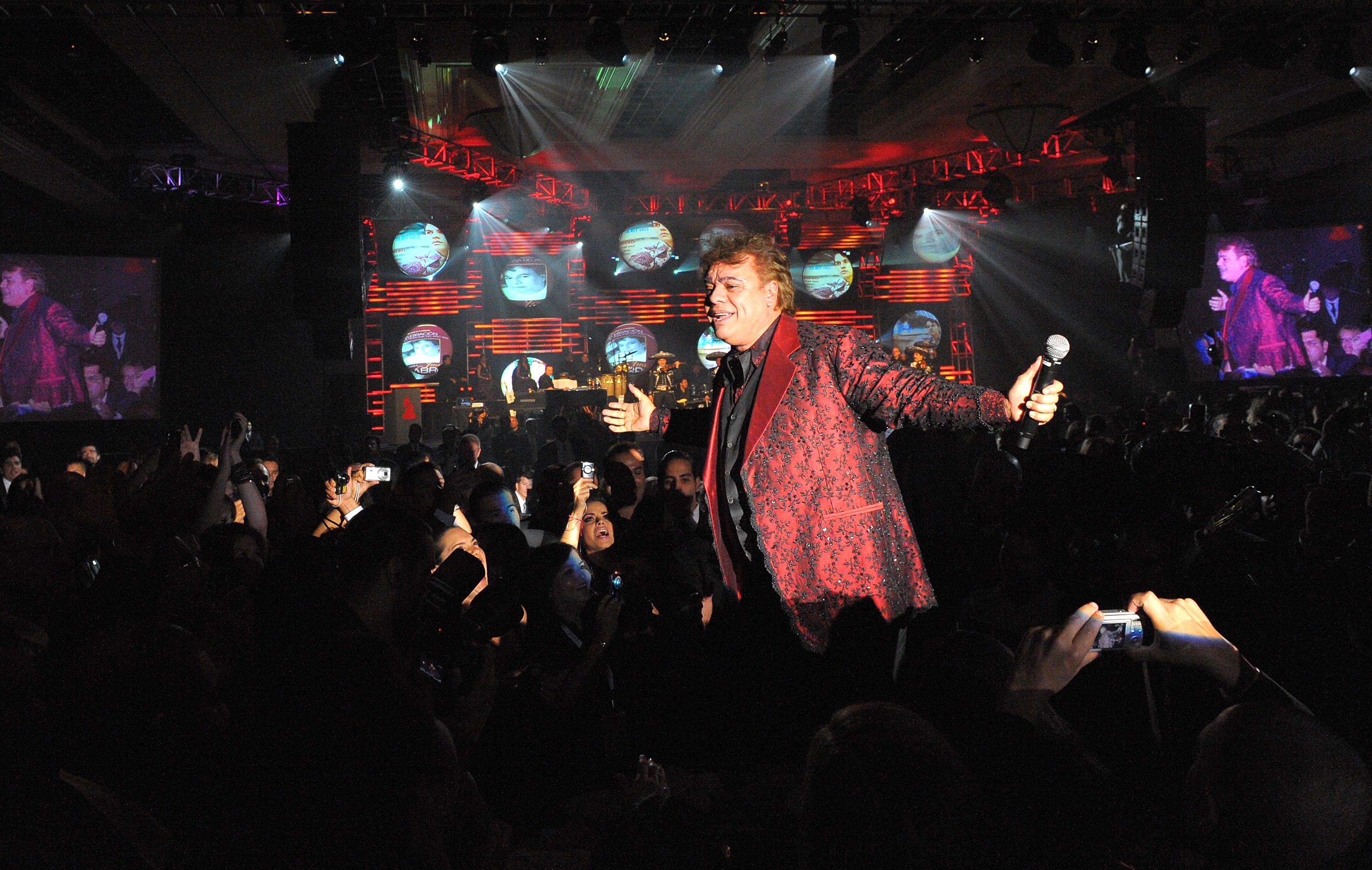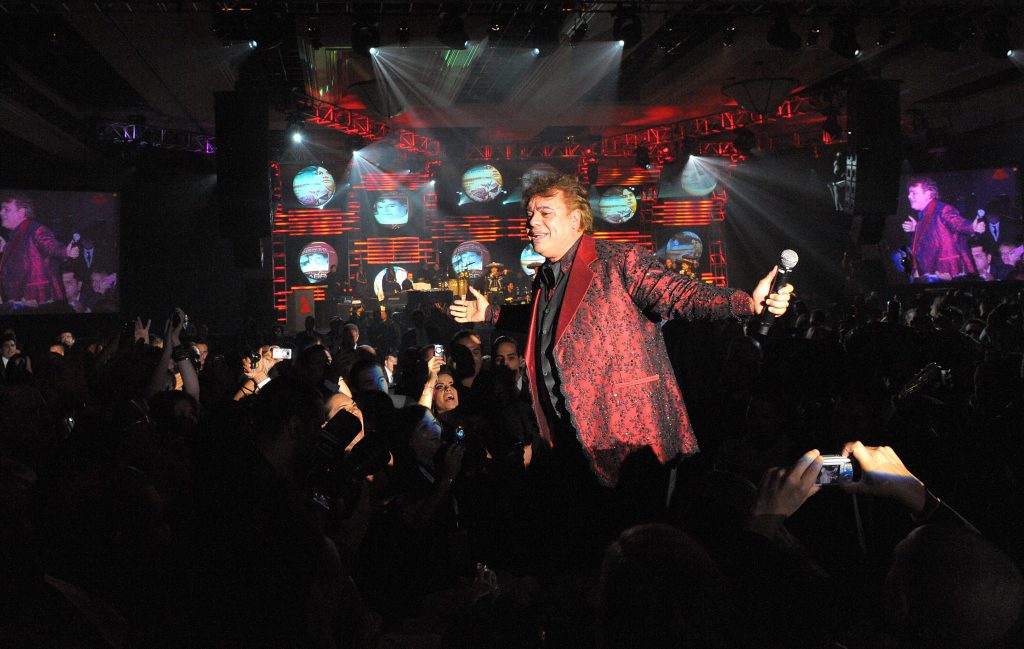Yesterday, Mexican singer and songwriter Juan Gabriel died of a heart attack at just 66 years old. He was a Latin American icon, at one time the highest-paid Spanish-language singer on Earth, a highly prolific artist who composed over 1,800 songs, put out 35 albums, and had his work performed by more than 800 artists in virtually all of the world’s languages. But beyond these impressive stats, he was an artist who succeeded in redefining a nation, a man who remained resolute in his dedication to representing his patria, even as his unabashedly effeminate persona defied its sexual mores.
In a 1998 interview with the LA Times, Juan Gabriel said, “American music has infiltrated the entire world enough as it is,” he says. “Mexican music must be defended, with vigilance. . . . My thoughts, my feelings, my spirit, they are all in Spanish. […] They say fame is important, and that maintaining your fame is even more important. But to me the most important thing is to deserve the respect of your fans.”
Juan Gabriel didn’t just defend Mexican music, he embodied it. And in the wake of his death his millions of fans have been paying him the respect he earned, with an outpouring of grief and tributes. In the midst of this loss, a few writers, music industry figures, and cultural critics have beautifully articulated the import of El Divo de Juarez. Below, we share some of these reflections on Juan Gabriel’s legacy, and the void he leaves behind.
1
Valerie Miranda, Label Relations Manager for US Latin and Mexico at Spotify
“They say that the most beautiful part about mariachis is the moment they arrive and the moment they leave. I must admit, I agree. In mariachi songs, the women are always damned wretches, who scorn the good hearts of the men who serenade them. Singing these songs has always been difficult for me; I don’t identify with “El Rey”, but I also don’t think I’m a harpy predisposed to destroying the hearts of men.
In Juan Gabriel’s songs, there are no heroes or villains. Juan Gabriel gave himself over to the ambiguity of life and love, outflanking those singers of the hairy-chested masculine variety. Juan Gabriel suffered. Juan Gabriel no nació para amar. His feelings were our feelings: he resigned himself, he longed, he remembered, he sighed. Juan Gabriel talked like us, but better. With just a few adjustments, his songs could have been performed by women. That’s why I sing them. That’s why they’re mine.
Juan Gabriel has no last name, and we don’t care whose son he is or what school he went to. He was effeminate, he dressed in sequins, he was delicate and sensitive and he transformed the morbid fascination with his sexuality with his declaration of absolute singularity: “lo que se ve, no se juzga.”
Juan Gabriel won. He pioneered the possibility of triumph over the kinds of adversity that most Mexicans face at birth: triumph over classism, homophobia, mass media. His life was the original telenovela – his impoverished childhood, his crazy father, and his stint in an orphanage gave him the tools to understand the pain of all Mexicans. His triumph over adversity was the inspiration for a society that was freeing itself from the bondage of its conservative education.
Yesterday we lost the architect of the Mexico that I adore.”
2
Josh Kun, Associate Professor of Communication in the Annenberg School at the University of Southern California
“To understand the breadth of Juan Gabriel’s influence on the Spanish-speaking world, think Sinatra and Prince (or as Gustavo Arellano crucially points out, Elton John and Cole Porter), mainstream + underground, normative + radical. Juanga was arguably the greatest living musical architect of Mexican love, loss, intimacy, excess, and festivity, from cantinas to queer clubs, quinces, & baptisms. He was all generations, genders, sexualities, genres, and styles. He sang them and he wrote them. He was an endless wardrobe change.
Casi aire.”
3
Gustavo Arellano, editor of OC Weekly
“Gabriel is without comparison—and while the same was true of his recently deceased peers in gender-fucking, Prince and David Bowie, there is simply no parallel to JuanGa (what everyone called him, and how I’ll refer to him here). His songs were the soundtrack to aching hearts, suffering women, and closeted folks for nearly 45 years, and gave them solace and comfort when few others would. He was proudly flamboyant in an era, in a country, synonymous with machismo, and made its power wane through him being him—as I tweeted today, Mexican boys are taught to ridicule Juan Gabriel, while Mexican men learn to respect the legend.”
4
Antonio Martínez Velázquez, co-founder of Horizontal
“There’s no way to overstate the importance of Juan Gabriel. The greatest has left us. Juan Gabriel succeeded in becoming our emotional pastor – and not just that, he succeeded in transforming the way we love. Carlos Monsiváis once said Juan Gabriel is a national institution (I personally wish a single one of our institutions could have that strength and genius). He wasn’t just the greatest composer, he was a poet in all senses of the word – he is up there with Sor Juana. He verbalized and invented our way of feeling. As Víctor Altamirano says, “in the midst of heartbreak, the lyrical ‘me’ of Juan Gabriel’s songs is not defiant, it doesn’t condemn, instead it suffers and resigns itself.”
In Escenas de pudor y liviandad, Monsivaís compared Juan Gabriel to Novo: “They were both chosen by a society that extolled them through a combination of verbal lynching and admiration. The sacred victims. The marginalized at the center.”
His were not simple concerts, they were religious, mystical, and communal experiences; his lyrics weren’t songs, they were hymns. His audience fell at his feet in order to immolate themselves before their idol. That uncommon, fabulous craze carried the popular imagination of a nation of machos on its back and domesticated it. It will be difficult to recognize ourselves without him, in spite of his eccentric covers and political jingles, he was our mirror. His lyrics created stars that would have otherwise never shone with such luster. He inspired musicians, writers and filmmakers; but above all else he inspired us in our daily lives and healed our heartbreak – no small feat in this hopeless motherland.
Viva Juan Gabriel.”




